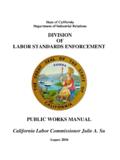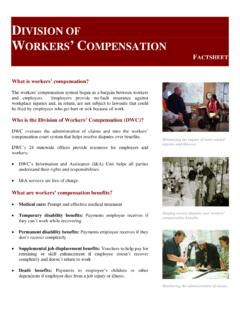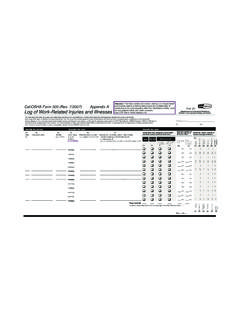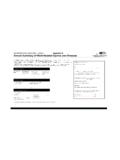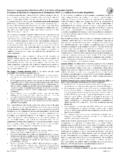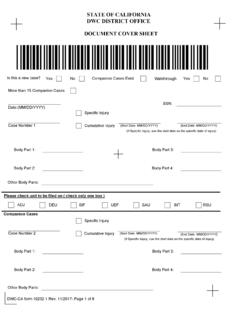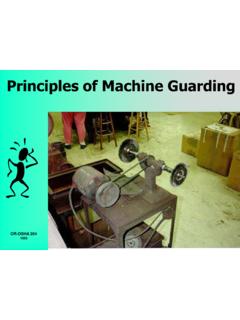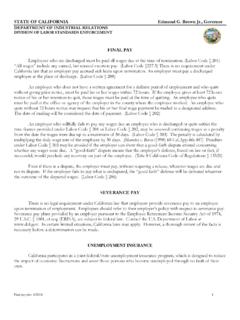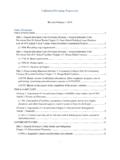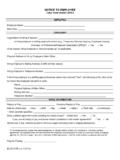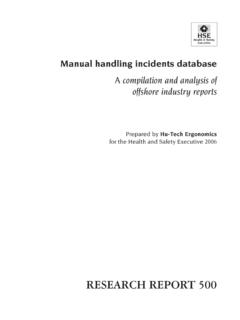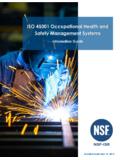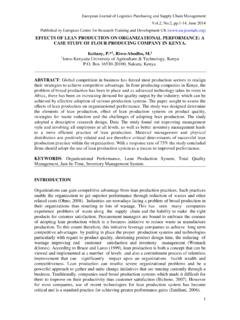Transcription of Working Safer and Easier - dir.ca.gov
1 Working Safer AND EASIERWORKING Safer AND EASIERfor Janitors, Custodians,and HousekeepersDepartment of Industrial RelationsCal/OSHA Consultation ServiceResearch and Education UnitWorking Saferand EasierWorking Saferand Easierfor Janitors, Custodians,and HousekeepersWORKING Safer AND EASIERW orking Safer and Easier : for Janitors, Custodians, and Housekeepers was developed and prepared forpublication by the Cal/OSHA Consultation Service, Research and Education Unit, Division ofOccupational Safety and Health, California Department of Industrial Relations. It was distributedunder the provisions of the Library Distribution Act and Government Code Section 2005 by the California Department of Industrial RelationsThis booklet is not meant to be a substitute for, or a legal interpretation of, the occupational safety andhealth standards.
2 Please see the California Code of Regulations, Title 8, or the Labor Code for detailed andexact information, specifications, and display or use of particular products in this booklet is for illustrative purposes only and does notconstitute an endorsement by the Department of Industrial Memory of Douglas BinionPublication InformationWORKING Safer AND EASIERWORKING Safer AND EASIERINTRODUCTIONFACT SHEETS FOR CREATING A Safer WORKPLACETips for Safe and Healthful to Safety and and Rest Equipment and Maintenance ProgramGeneral Your Slips, Trips, and and Their Health for Safe Handling and Use of Personal Protective EquipmentUsing Office Trash Garbage from a Trash and Mop Tile Soiled and BreaksACKNOWLEDGMENTSWORKER TRAINING AND INSTRUCTION RECORDEMPLOYEE SAFETY POSTERSC ontentsWORKING Safer AND EASIERJ anitors, custodians, and others who work in the cleaning industry need a safe and healthfulworkplace.
3 Two educational products have been developed: one is a series of fact sheets, and the otheris a series of posters. Both products have been designed to be used by companies of any size and inplaces such as schools and universities, office buildings, apartments, and rental properties. They mayalso be used by housekeeping services for hospitals, hotels, and motels. Tips for Managers (fact sheets 1 8) are intended to provide business owners, managers, andsupervisors with helpful tips for managing the staff and the workload. It may increase productivityin a safe and healthful way. The remaining fact sheets are intended for owners, managers, and supervisors to use whentraining employees during new employee orientation, tailgate meetings, classroom training, andwhenever sharing of information is useful:General Guidelines (fact sheets 9 15) address various topics to help increase awareness of themost common workplace hazards.
4 They give ideas for greater efficiency and the prevention Ergonomics (fact sheets 16 33) address specific tasks and the risks involved. They featureways of using equipment and best work practices. The posters are to be displayed where they can help janitors, custodians, and housekeepers withthe tasks they perform routinely. Practical suggestions for accomplishing tasks safely are shown inphotos. The posters are designed to be displayed a few at a time in areas frequented by should periodically change the display to give employees new tips on Working safelyyet this information can help employers, managers, and supervisors lower the cost of doingbusiness, reduce workers compensation costs, and retain a more stable workforce that delivers qualitywork with greater efficiency and productivity.
5 Employees can benefit by protecting their health,income, and future job Safer AND EASIERWORKING Safer AND EASIER1. A Safe and Healthful Workplace2. Commitment to Safety and Health3. Effective Communication4. Training5. Work Assignment6. Productivity and Rest Breaks7. Buying Equipment and Supplies8. Equipment Maintenance ProgramWorkplace hazards can be costly as workers may suffer injuries. You can make a differenceby implementing the tips in the following fact sheets:Tips for ManagersWORKING Safer AND EASIERWORKING Safer AND EASIERWORKING Safer AND EASIERE mployers are responsible for providing a safe and healthful workplace. They must follow state lawsgoverning job safety and health.
6 The type of tasks performed by your employees and the job hazardsthey may face determine which Cal/OSHA regulations to regulation calls for all employers to develop an Injury and Illness Prevention Program. The Injuryand Illness Prevention Program is the first and most important way for an employer to reduce potentialworkplace hazards. The Injury and Illness Prevention Program is a blanket or umbrella safety programthat can incorporate other required Cal/OSHA regulations. Depending on the types of tasksperformed, you may be required to develop programs involving lock-out/tag-out procedures, personalprotective equipment, bloodborne pathogens and other biological hazards, or a hazard communicationprogram, and so : These fact sheets do not address all the safety and health hazards that may exist at your focuses on some of the most common hazards further resources on how to develop an effective safety and health program, review the Guide toDeveloping Your Workplace Injury & Illness Prevention Program and the California Code of Regulations, Title 8(T8 CCR), Section 3203, Injury and Illness Prevention Program.
7 That guide and other Cal/OSHA publications may be viewed, downloaded, and ordered free of charge from the Department ofIndustrial Relations Web site ( ).You can also get help in identifying and correcting safety and health hazards in your workplace bycalling the Cal/OSHA Consultation Service. To schedule a free technical assistance visit, obtain furtherinformation, or learn about other services, contact your nearest area office of the Cal/OSHAC onsultation Service or call our toll-free number at (800) Cal/OSHA Enforcement and Cal/OSHA Consultation Service are both part of the Division ofOccupational Safety and Health (DOSH), the Consultation Service performs a separate function.
8 A Safe and Healthful Workplace1 Tips for ManagersWORKING Safer AND EASIERWORKING Safer AND EASIERWORKING Safer AND EASIER2 Commitment to Safety and HealthTips for ManagersMake sure enough PPE is observing and looking fora Safer way to accomplish the taskSupport from top management and employees is critical for a Safer workplace. It is essential to: Look carefully at the work environment toidentify problems and potential risks. Get ideas from employees on reducing oreliminating risks. Take corrective actions. Be sure to follow up. Let workers know that safety rules protecttheir health and ability to make an income. Instruct workers they are expected to use safework practices.
9 Lead by example and show your commitmentto health and safety at your job. Observe how different employees whoperform the same job vary in the way theyactually accomplish the work. Variations canreveal real opportunities for risk reduction. Encourage employees to report hazardousconditions. Respond promptly to workers concerns. Negotiate changes with building owners, ifnecessary. Provide personal protective equipment (PPE)free of charge to Safer AND EASIERC ommitment to Safety and Health (cont.)2 Tips for ManagersRethink how to change a physically demandingjob to make it Safer or less demanding so mostworkers can successfully perform that job. Forexample, replace string mops.
10 Use lightweight microfiber mops. Certain types of microfiber mops aredesigned so that, once soiled, they can bedetached and laundered. Other types of microfiber mops are usedwith a bucket (see photos), and less forceis needed to wring these mops. Use a lightweight telescopic pole toextend workers force is required to wring a microfiber with a microfiber mopWORKING Safer AND EASIERWORKING Safer AND EASIER3 Effective CommunicationTips for Managers Be alert and report dangerous conditions. Suggest ways to help cut costs and improveproductivity. Develop ideas to help solve workplace health andsafety problems. Produce higher-quality work. Meet with staff regularly to talk through issuesclearly and resolve problems.
